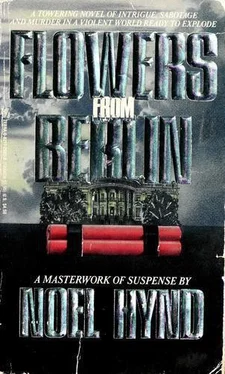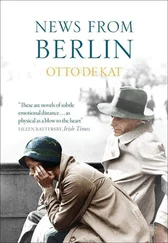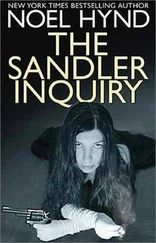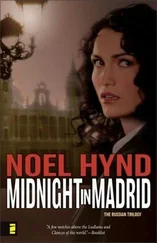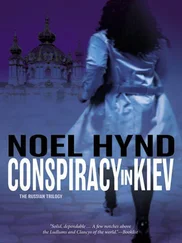Noel Hynd - Flowers From Berlin
Здесь есть возможность читать онлайн «Noel Hynd - Flowers From Berlin» весь текст электронной книги совершенно бесплатно (целиком полную версию без сокращений). В некоторых случаях можно слушать аудио, скачать через торрент в формате fb2 и присутствует краткое содержание. Жанр: Политический детектив, на английском языке. Описание произведения, (предисловие) а так же отзывы посетителей доступны на портале библиотеки ЛибКат.
- Название:Flowers From Berlin
- Автор:
- Жанр:
- Год:неизвестен
- ISBN:нет данных
- Рейтинг книги:3 / 5. Голосов: 1
-
Избранное:Добавить в избранное
- Отзывы:
-
Ваша оценка:
- 60
- 1
- 2
- 3
- 4
- 5
Flowers From Berlin: краткое содержание, описание и аннотация
Предлагаем к чтению аннотацию, описание, краткое содержание или предисловие (зависит от того, что написал сам автор книги «Flowers From Berlin»). Если вы не нашли необходимую информацию о книге — напишите в комментариях, мы постараемся отыскать её.
Flowers From Berlin — читать онлайн бесплатно полную книгу (весь текст) целиком
Ниже представлен текст книги, разбитый по страницам. Система сохранения места последней прочитанной страницы, позволяет с удобством читать онлайн бесплатно книгу «Flowers From Berlin», без необходимости каждый раз заново искать на чём Вы остановились. Поставьте закладку, и сможете в любой момент перейти на страницу, на которой закончили чтение.
Интервал:
Закладка:
"I'm okay, sir." Reilly answered. "Fine, actually. Thank you."
Then the President of the United States returned to his reading. As everyone knew, Franklin Delano Roosevelt's fascination with naval matters was one of the paramount concerns of his life.
PART EIGHT
FORTY-SIX
On the wall of Memorial Hall, the hour, minute, and second hands of the clock came together at the twelve. Dr. Cochrane had run ten minutes past his time. But few students had complained.
He looked to his left and the Englishwoman with the gray hair smiled and motioned to her watch. Suddenly Bill Cochrane was aware of the time. He apologized to the class. They were in a forgiving mood.
Over the last two hours Bill Cochrane had told them about what might have been. It had gone like this, or so Dr. Cochrane had speculated:
With Roosevelt dead or disabled on the presidential yacht, the 1940 election might have been between Wendell Willkie, the bright young star of the Republicans, and John Nance Garner, who had split the Democratic Party by wresting the nomination away from Henry Wallace.
Willkie, the internationalist, had defeated Garner. The Republicans had gone into office. Lend-Lease had happened anyway, only it had come several months later and only in time to repel an invasion of Great Britain.
"The English are people of great tenacity," Cochrane had stressed in his lecture, "as are the American people. Politics of the extreme come and go in both nations. What you must remember is that both peoples will always rally at a point of moderation. Great leaders are important, but never forget-in a democracy the great leaders are allowed to lead only because they are elected."
Hitler, Cochrane postulated further, had asked his Japanese allies to refrain from attacking Pearl Harbor until England could be defeated. When the R.A.F. and British Navy refused to buckle, Japan attacked anyway on February 21, 1942. A Sunday morning, naturally. America entered the war. It ended by January of 1946. By that time, Thomas Dewey was the President of the United States, having assumed office when an overweight, chain-smoking Willkie suffered his fatal heart attack in 1944.
"The United Nations happened anyway, as did the atomic bomb," Dr. Cochrane theorized. "These, like the war, were events set in motion, more than the actions of a single man. Harry Truman never left the United States Senate and MacArthur never became President because of his dispute with President Dewey over Korea in 1951. Eisenhower became President the next year-running as a Democrat, he defeated Senator Taft-and the McCarthy era happened anyway. Again, events were set in motion. American history always drifts toward the center course, no matter who the personalities involved."
Dr. Cochrane then wrapped up. He told the old joke that had made its rounds of the Harvard Faculty Club since the 1970s: A woman falls into a coma in 1954, and comes out of it in 1980. "How is Senator Taft?" she asks. "Senator Taft is dead," she is told. "How is Senator McCarthy?" she next asks. "Senator McCarthy died," she is told. "Well, then," she inquires at last, "how is President Eisenhower?" "President Eisenhower is dead," she is informed. To this she finally reacts in horror. "Oh, no!" she cries. "That means Nixon is President!"
The class erupted in laughter. Bill Cochrane, at the spot of his yearly triumph, closed his notebook, held a hand aloft, and waved. The class stood appreciatively and applauded, as was the custom on the last day of lectures.
Some started to file toward the exits but others stayed in place and applauded for several minutes. Bill Cochrane stepped away from the lectern, slightly embarrassed by the outpouring of approval, and his wife Laura came to him. He tried to wave a final time to the class, to dismiss them and send them on to their next sessions.
And gradually the applause did begin to die. But Bill Cochrane was distracted again, because he caught something in Laura's eyes, something he had seen so many times over the decades, something he had seen so long ago: pride, strength, integrity, and tenacity. All the things he had fallen in love with within this woman, in addition to the woman herself: all the things that had made a successful marriage endure forty-three years.
The applause was distant and then neither of them heard it at all. They were somewhere else, remembering.
"You absolute ham," she said to him. "You should have been an actor."
"I was, you know," he teased her. "Many years ago. In Provincetown, Massachusetts. Eugene O'Neill used to come see us."
"Of course, dear," she said. "And I was a spy."
They both laughed. He took Laura's hand and they walked toward the exit at the right of the lectern. He gave the class a final wave and did in fact savor the moment, as she had always accused him.
"Next year," he said aloud. "That's it until next year."
Then they were out the door together. There would always be, Bill and Laura Cochrane believed, a next year. And for another twelve years there was until both of them, in the last decade of the Twentieth Century, passed away quietly and disappeared into the history that they had helped write.
Интервал:
Закладка:
Похожие книги на «Flowers From Berlin»
Представляем Вашему вниманию похожие книги на «Flowers From Berlin» списком для выбора. Мы отобрали схожую по названию и смыслу литературу в надежде предоставить читателям больше вариантов отыскать новые, интересные, ещё непрочитанные произведения.
Обсуждение, отзывы о книге «Flowers From Berlin» и просто собственные мнения читателей. Оставьте ваши комментарии, напишите, что Вы думаете о произведении, его смысле или главных героях. Укажите что конкретно понравилось, а что нет, и почему Вы так считаете.
